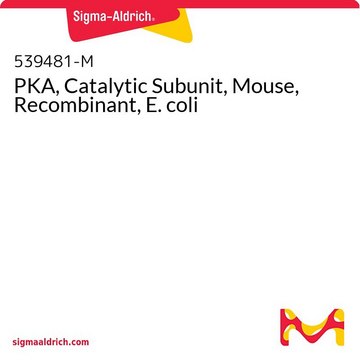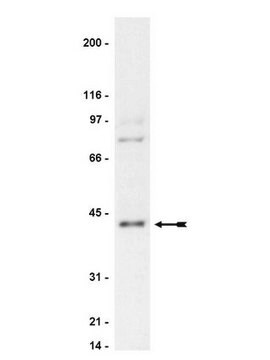539576
PKA, Catalytic Subunit, Bovine Heart
Synonyme(s) :
cAMP-Dependent Protein Kinase Catalytic Subunit, Protein Kinase A, Catalytic Subunit
About This Item
Produits recommandés
Source biologique
bovine heart
Niveau de qualité
Essai
≥90% (SDS-PAGE)
Forme
liquid
Activité spécifique
≥20,000 units/μg protein
Fabricant/nom de marque
Calbiochem®
Conditions de stockage
OK to freeze
avoid repeated freeze/thaw cycles
Technique(s)
activity assay: suitable
Adéquation
suitable for molecular biology
Conditions d'expédition
wet ice
Température de stockage
−70°C
Description générale
Native PKA catalytic subunit purified from bovine heart. Protein Kinase A (PKA) is a serine protein kinase that targets serine and threonine residues.
Actions biochimiques/physiologiques
Conditionnement
Avertissement
Définition de l'unité
Forme physique
Reconstitution
Autres remarques
Rannels, S.R., et al 1983. Methods Enzymol99, 55.
Witt, J.J. and Roskoski, R. Jr. 1975. Anal Biochem.66, 253.
Informations légales
Code de la classe de stockage
12 - Non Combustible Liquids
Classe de danger pour l'eau (WGK)
WGK 1
Point d'éclair (°F)
Not applicable
Point d'éclair (°C)
Not applicable
Certificats d'analyse (COA)
Recherchez un Certificats d'analyse (COA) en saisissant le numéro de lot du produit. Les numéros de lot figurent sur l'étiquette du produit après les mots "Lot" ou "Batch".
Déjà en possession de ce produit ?
Retrouvez la documentation relative aux produits que vous avez récemment achetés dans la Bibliothèque de documents.
Notre équipe de scientifiques dispose d'une expérience dans tous les secteurs de la recherche, notamment en sciences de la vie, science des matériaux, synthèse chimique, chromatographie, analyse et dans de nombreux autres domaines..
Contacter notre Service technique








